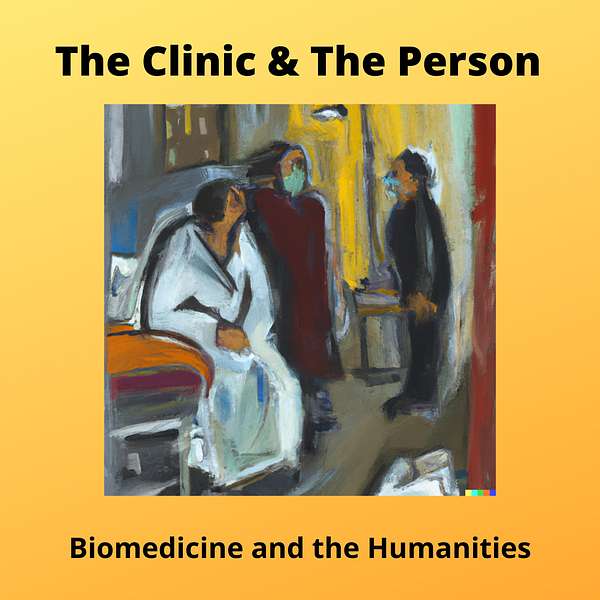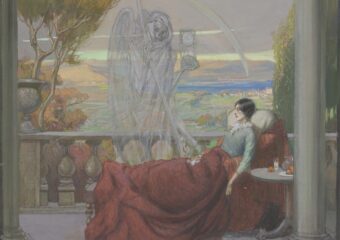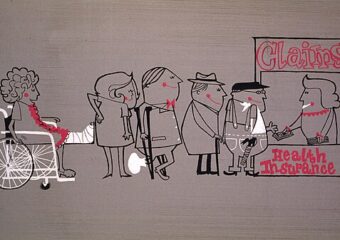The first episode of the podcast, The Clinic & The Person, was published in September of 2022 and has over the two years since, published 22 episodes. The podcast presents works from the Humanities that bring knowledge and perspectives about particular clinical events and health care situations, which, as such, mirrors this blog. Many of the podcast episodes have corresponding blog entries.
Drawing from a broad range of genres in the Humanities is a particular podcast objective. Over the 22 episodes, the podcast has drawn from these genres:
- Literary fiction (novels, short stories)
- Speculative fiction
- Nonfiction
- Narrative nonfiction
- Essay
- Narrative memoir
- Graphic memoir
- Poetry
- Film (fiction, documentary, dramatization)
- Painting
- Plays
- Greek tragedyPhilosophy of science
On some of the episodes, guests join me and cohost Dan Albrant. They have included authors, memoirists, poets, health care specialists, and scholars. Descriptions of the episodes are listed below.
Introduction
Introducing The Clinic & The Person
The cohosts describe how they will draw works from the Humanities and how health care professionals, educators, researchers, counsellors, and caregivers among others can apply them. The cohosts tell how their professional careers motivated them to create the podcast.
Episode 1
Holes and Lobotomies: Seeing and Feeling Migraine
Genres: Literary fiction; essay
We examine excerpts from Siri Hustvedt’s novel, The Blindfold, and from Joan Didion’s essay, In Bed, for the perspectives they offer on what people experience when migraines strike them. We discuss how Hustvedt’s and Didion’s renderings of migraines add to classic biomedical descriptions, and consider the implications of migraine prevalence on the degree of suffering, functioning, and health care consumption. We muse about how these literary texts and others like them can be applied in helping people who suffer migraines and in helping people who care for them.
Episode 2
When the Bolt Touches Flesh: Living with Epileptic Seizures
Genres: Literary fiction; memoir; movie
What can it be like to have epileptic seizures? We draw from four sources—a memoir, two novels, and a movie. In particular, we the cover how these sources depict convulsive seizure events as people may experience them, the physical and mental harm they can produce, and the adaptations to daily activities and life plans they motivate. We compare these renderings with a description from classic biomedical text, and offer thoughts on how they can expand the understanding of the ways epileptic seizures affect the lives of those who suffer from them, and reveal possibilities for better lives they could achieve.
Episode 3
Sweet Sand of Time: James Dickey’s poem Diabetes with Dr. Jack Coulehan
Genre: Poetry
We feature James Dickey’s poem, Diabetes, with our guest, the renowned physician-poet Dr. Jack Coulehan. We discuss insights the poem offers about the trajectory of type 2 diabetes from the time of symptom onset until the time a balance is achieved between maximum compliance with disease management requirements and the compromises an acceptable lifestyle can necessitate for many individuals. In addition to providing his perspectives on how the poem expands on the biomedical components of diabetes in recognizing effects such as fear, anxiety, frustration, and oppression, Dr. Coulehan recounts how he has used this poem and others in teaching medical students and residents. He also tells stories of particular instances in which he used poetry as part of the care he provided certain patients, and as a way to connect with them.
Episode 4
Six Kopeks or Your Life: Two Short Stores about Health Care Professionalism and Access
Genre: Short stories
We draw from two short stories published long ago, but recently discovered, that help us discern whether current problems associated with professionalism in health care and access to health care are unique to our time, or whether they have always been with us in one form or another. One of the stories is Anton Chekhov’s At the Pharmacy, written in 1885 and found in the late 1990s, and the other story is Raymond Chandler’s It’s All Right – He Only Died, written in the late 1950s and found in 2017. A throughline from these stories led us to the classic, 1978 satirical novel, The House of God, by Samuel Shem. We consider its importance to health care professionalism at the time—including our own professional behavior—and whether its influence persists. We conclude musing about how the perspectives these sources offer can be used in modern-day health care.
Episode 5
Beautifier or Destroyer: Tuberculosis in Two Paintings
Genre: Paintings
We explore two paintings, each rendering one of two different perspectives on tuberculosis (TB). We first take a close look at Alice Neel’s 1940 painting, T.B. Harlem, and focus on how it depicts the suffering and destruction TB caused, and reveals some of the social determinants of TB at the time. We then examine Thomas Lawrence’s 1794 painting, Portrait of Catherine Rebecca Grey, Lady Manners, and work through how it conveys the convergence of TB clinical manifestations with beauty ideals at the time.
Episode 6
I Hold You Still?: Poet Micheal O’Siadhail Explains Parkinson’s Disease in Sonnets
Genre: Poetry
The internationally-acclaimed poet, Micheal O’Siadhail joins us to talk about One Crimson Thread, a memoir of 150 sonnets he wrote about the last two years of his late wife’s life with Parkinson’s disease. O’Siadhail reads four sonnets from the book relating directly to clinical scenarios familiar to health care providers, caregivers, and family members, and to the trajectory Parkinson’s disease exhibits. We discuss the insights they offer that extend beyond those of conventional biomedical sources. O’Siadhail also tells us how the forms of poems contribute to their meaning, and offers thoughts on what drives fear of poetry among many, a fear that could needlessly result in missing the 150 opportunities in the book to better appreciate the array of issues confronting people with Parkinson’s disease than is otherwise possible.
Episode 7
A Lifespan the Length of a Dog’s: Illness as Loss in the Novel So Much For That
Genre: Literary fiction
We consider “illness as loss” through three different scenarios from Lionel Shriver’s novel, So Much For That. The three scenarios are: sociopsychological, financial, and clinical. We focus on how the literary novel form isolates these scenarios and offers fully reflective accounts of how people can be affected by them. We also note how literary fiction can be the only or best medium for subjects often too sensitive for public forums such as whether money can be an object in health care decisions. We spend some time distinguishing illness as what people experience subjectively from a particular health problem, and disease as the pathophysiological basis for a particular health problem. Dan talks about how illness as loss is a useful concept for discerning the help people may need, and how using the word “loss” can be a valuable tool for helping them.
Episode 8
Getting Dopesick: Four Angles on the Opioid Crisis
Genres: Literary fiction; nonfiction; narrative nonfiction; film dramatization
We feature four different angles addressing the opioid crisis, mostly as the opioid product OxyContin is involved and as the Appalachian region is affected. Our objective is to show how realms outside Biomedicine—the Humanities, in this case—can provide a range of perspectives suited to preferences, interests, and needs for understanding a particular issue. The four angles we feature are: nonfiction investigative journalism; nonfiction dramatization; narrative nonfiction; and literary fiction. We consider different approaches to selecting the best choice or the best order among available options.
Episode 9
How Terrible it Was: Three Takes on the AIDS Crisis with Dr. Ross Slotten
Genres: Memoir; literary fiction; documentary film
On this episode, we talk with Dr. Ross Slotten about his memoir, Plague Years: A Doctor’s Journey through the AIDS Crisis. He covers the time from when he entered family medicine practice just as AIDS was emerging, through the crisis, and the decades since as both a physician and a member of the at-risk community of gay men on the north side of Chicago. We also talk with Dr. Slotten about two other sources covering the early years of the AIDS crisis: a documentary film about the first country’s first AIDS unit at San Francisco General Hospital, and a literary novel about a group of gay men with AIDS or at risk for AIDS in Chicago.
Episode 10
If Pain Were Coupled with Light: The Novel The Illumination with Dr. Ron Boeding
Genre: Speculative fiction
“To have great pain is to have certainty; to hear that another person has pain is to have doubt,” Professor Elaine Scarry has said, and furthermore stipulates that, “Physical pain not only resists language, but actively destroys it.” She has suggested “fictional analogs” could have application in conveying the existence of pain where there is doubt. We consider whether the speculative novel, The Illumination, could serve as a fictional analog. The novel centers on a sudden phenomenon in which a light shines from the part of anyone’s body where there is pain, and so erases any doubt. Though the author’s motivation for the phenomenon was not based on Scarry’s premise, we contemplate possible applications for it in Biomedicine and other realms where people in pain seek help.
Episode 11
The Dose Makes the Poison: Two Novels, Two Poisons, Two Emergency Medicine Physicians
Genres: Literary fiction
We look at two literary descriptions of self-poisoning through the novels, Belladonna and Madame Bovary, and compare them with classic biomedical texts. We focus on how vividly the literary texts depict what people can go through after having poisoned themselves with belladonna or arsenic, how well these descriptions represent or elaborate on biomedical texts and teaching, and the applications they offer to health care practitioners, students, and the general public.
Episode 12
When Neurons Get Tied Up in Knots: Human Fallibility and Folly in Asylum Psychiatry
Genres: Movie; documentary film; nonfiction book
We look to three sources, a movie (The Mountain), a documentary film (The Lobotomist), and a nonfiction book (Desperate Remedies), for perspectives on human fallibility and folly in American asylum psychiatry during the first half of the 20th century. We focus in particular on the consequences of the overconfidence asylum psychiatry exhibited, the problem of medical knowledge in play, and the vulnerability of affected people from an absence of agency. These sources pointed to lobotomies, dental extractions, abdominal eviscerations, insulin comas, and other like illustrative interventions as case studies of what were once hailed as best medical practices that became horrors later. Recognizing that human fallibility and folly are an unchangeable feature of the human condition, we muse about whether we are any less exposed to such horrors today and forever.
Episode 13
He Wants to Itch at It: A Novel, Play, and Movie Imagining Dementia
Genres: Literary fiction; movie; play
What could it be like to have dementia? We can’t know. But the arts can imagine what people with dementia could be going through, and many works have been produced for that purpose. We feature a literary novel (The Wilderness), and a play (The Father) and its movie adaptation, offering sophisticated renderings of dementia for consideration. In the course of our conversation about these works and how they imagine dementia, we include: how an illusionist was part of the creative team in The Father to produce a sense of disorientation among audience members; how the metaphor of “the wilderness” is used in the novel and more broadly in various texts from the beginning of civilization; and how well the psalm used in the novel worked and builds on the place of psalms as texts for understanding how people react when threatened by significant life events.
Episode 14
Reconciliation and Denial: Two Elements of Family Dementia Stories
Genres: Literary fiction; literary nonfiction
The millions of families dealing with Alzheimer’s disease produce millions of their own stories. We focus on two particular elements that can be part of a family’s story about dementia. One, from a collection of autobiographical stories, centers on an adult daughter with a long-standing, and justifiable antipathy towards her mother, who nevertheless finds a way to aid her when dementia takes hold. And, while doing so, she finds a new relationship with her mother and takes delight in the personality dementia produces for a time. The other, drawn from a novel, centers on various forms of denial a wife exhibits over several years of her husband’s dementia progression.
Episode 15
Painting with Empathy: The Expressionist Art of Edvard Munch with Curator Øystein Ustvedt
Genre: Painting
The interview with Curator Øystein Ustvedt at the National Museum in Oslo, Norway, concentrates on Munch’s work expressing emotional dimensions of anxiety, illness, grief, and suffering. Ustvedt talks about how Munch’s life story explains the sources for his empathy and artistic inclinations, identifies and discusses the paintings particularly effective in expressing emotions illness and suffering generate, and considers how Munch’s work could benefit health professions students and practitioners.
Episode 16
Life Imitates Art: Covid-19 Edition
Genre: Literary fiction
Human behaviors in many segments of society during the Covid-19 pandemic could have been predicted based on literary texts from the past and right up to the moment the pandemic began. In this episode, we compare excerpts from selected literary texts imagining or depicting human reactions to plagues ranging from as far back as 700 years to just one month after the pandemic began with statements made or actions taken during the pandemic. The similarities are uncanny. Russell is inclined to think this means we’re doomed; Dan is not so inclined.
Episode 17
AIDS in the Comics: The Graphic Memoir Taking Turns with MK Czerwiec
Genre: Graphic memoir
We return to the subject of how terrible the HIV/AIDS crisis was at its peak. The first time (Episode 9) we drew from a memoir, documentary film, and a literary novel. This time we feature the graphic memoir, Taking Turns: Stories from HIV/AIDS Care Unit 371 with the author MK Czerwiec. She created a memoir of her time as a nurse in an HIV/AIDS using the comic medium. Since then, Czerwiec has become a leading figure in Graphic Medicine. We talk to her about the Graphic Medicine field and its many applications, and about the many illustrative and poignant insights her book offers about the AIDS crisis in ways biomedical texts and few of the other arts can do nearly as well.
Episode 18
What Desire Will Shape a World We’re Left?: Poet Micheal O’Siadhail on Covid
Genrie: Poetry
Four years after the Covid pandemic began, as daily life has returned in large measure to its pre-pandemic shape, assessments and reflections about how the pandemic was able to wreak such havoc and how it could be prevented from occurring again are coming forth. Many are technocratic in nature and assume our aims and pursuits will remain the same as before. Micheal O’Siadhail, in his new book of poems, Desire, says that in addition to technocratic responses to the pandemic (and other threats to civilization covered in the book), we should give serious thought to what we desire. We talk to O’Siadhail about this idea and he reads selected poems from the book that characterize many aspects of what the pandemic put people through collectively and individually. He also talks about how the forms of his poetry convey his thoughts just as his words do, and how poetry, through syntax, sound, meter, and intensity, can add clarity and effectiveness to prosaic prose communicating complex concepts.
Episode 19
Andrew Leland’s Country of the Blind: It’s the Same World
Genre: Memoir
Andrew Leland is a major figure as a writer, editor, producer, teacher, and podcaster across the mainstream American cultural landscape. He has contributed to the New York Times Magazine, The New Yorker, The Believer, McSweeney’s, Radiolab, The Organist, and 99% Invisible among other respected sources, and has taught at prestigious universities. Amidst it all, he has been progressing towards blindness as a result of retinitis pigmentosa. As his sight diminished to the extent he needed assistance, Leland became motivated to investigate what the world would be for him when his sight was all but gone. In his book, The Country of the Blind, he reports his findings and conclusions. He shares this title with the H.G. Wells story he uses as a touchstone and through line. Russell Teagarden and Dan Albrant talk about what can be drawn from Leland’s experiences and from the writers and artists he calls mentors, and how he expects his world will be the same when he is blind as it was before.
Episode 20
“I’m Filled with Desire”: Eros & Illness with David B. Morris
Genre: Nonfiction
People can have certain desires stemming from their illnesses, for the arts, health, companionship, serenity, and meaning among other possibilities. The scholar, writer, and teacher David B. Morris considers these desires a form of eros that should be taken into account as a part of what people go through with their illnesses and what could potentially help them. We speak with David Morris about the relationship between eros and illness, and evaluate it using examples from art, literature, and theater. We muse about possible applications.
Episode 21
“No Escape from Reality:” Thomas Kuhn and the Reliability of Medical Knowledge
Genre: Philosophy of science
“Should we worry about the reliability of medical knowledge?” asks philosopher John Huss (University of Akron). We consider this question from the perspective of Thomas Kuhn’s classic, 1962 book, The Structure of Scientific Revolutions. Kuhn explains how science does not evolve incrementally, one step following another, but rather undergoes wholesale revolutions disconnected from all that came before. He called these revolutions, “paradigm shifts” (to his everlasting regret). While Kuhn draws mostly from astronomy to make his case, we draw from recent and past medical examples to show how his concept applies to medicine as well. We talk about how various groups dependent on reliable medical knowledge (e.g., patients, health care professionals, educators) can be affected by the possibility of major shifts in established approaches to health care at any time. There’s no escape from reality, as the song goes.
Episode 22
Illness as Exile in the Greek Tragedy Philoctetes with Paul Ranelli
Genre: Greek tragedy
Greek tragedies often concern identifiable and universal problems humans have confronted over the millennia. Among these problems are those illness and suffering create. In this episode we draw from Sophocles’ play, Philoctetes, and in particular, how it depicts illness as exile. With our guest, Professor Paul Ranelli, we first cover the characteristics of Greek tragedies that are applicable to illness and suffering (i.e., enduring relevance, catharsis, empathy). We then cover the play, Philoctetes, what it tells about illness as exile, and how it connects to more recent writings on the concept (e.g., Virginia Woolf and Susan Sontag). Lastly, Paul Ranelli talks about an initiative he was involved in with the University of Minnesota Department of Theater Arts and Dance, the Center for the Art of Medicine, the College of Pharmacy Center for Orphan Drug Research, and the playwright Kevin Kling. This collaboration developed and staged an adaptation of Philoctetes highlighting challenges rare diseases pose. Paul describes how it was conceived, developed, produced, and performed. He also talks about how patients, families, students, health care professionals, and others received it. Spoiler alert: they loved it and saw great value in the endeavor.



